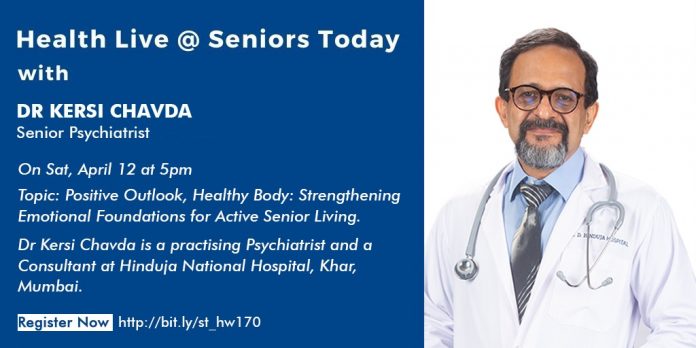On 12 April, 2025, Seniors today hosted their weekly Health Live Webinar with a Senior Psychiatrist, Dr Kersi Chavda who spoke on and answered questions about Strengthening Emotional Foundations for Active Senior Living.
Dr Kersi Chavda is a practising Psychiatrist and a Consultant at Hinduja National Hospital, Mumbai. He has presented many papers at various national forums on issues dealing with mental health, organised many seminars and workshops, and written chapters in two books dealing with adolescent stress and pediatric issues. He also ran a newspaper column on issues relating to psychological health for a year and a half.
In today’s time and generation, people have started visiting a psychiatrist more often, they are talking about their issues and problems- which is a good thing.
For the seniors, it becomes a little difficult at times to talk about their concert. This can be because their symptoms may be dismissed by their family members as a part of the process of ageing. But in today’s time, we don’t have to accept our symptoms.
Of course, as we age, the brain does become smaller, there is plaque formation in the brain, etc. but there are a lot of things that can be done to make life better, so you don’t really need to suffer.
The most common types of psychiatric problems are:
- Depression: in the young, middle aged and the old age.
- When we speak of depression, we speak of a person who doesn’t seem to enjoy anything in life which he earlier used to find pleasurable.
- Feeling of hopelessness, feeling of helplessness and feeling of uselessness
- It is an illness and it needs to be treated as any other illness.
- The frightening thing about depression is of course, suicidal tendencies and attempts.
- The commonest age at which suicide occurs is during teenage. But we also have a late number of senior citizens as well who can’t cope with what is happening to them, who feel lonely.
- There is also the empty nest syndrome where the kids stay abroad. The kids love them but can only visit them once a year for a month.
- Your physical ailments and any financial issues and inability to cope with them can also cause you to develop depression.
- Anxiety: this is something that we see in general and also in particular as we grow older.
- Associated with the feeling of an impending doom
- You constantly feel like you might end up in a bad situation or you might do something that might end up badly.
- Social anxiety
- Cant get into a lift/ closed spaces- claustrophobia
- The ultimate cause of anxiety is a panic attack. A panic attack is where you end up feeling like you’re going to have a heart attack. But this attack does not start from the heart, it starts from the brain. You can have palpitations, difficulty in breathing, dizziness, incoherent speech.
- All your tests and investigations come out to be within normal limits, giving a conclusion that there is nothing wrong with your heart.
- A panic attack can be incapacitating.
- However, this can easily be dealt with through meditation and therapy.
- Compulsive action: doing an action in a ritualistic way to gain control over your anxiety, leading to a cycle of performing the activity to control your anxiety and the action causing the anxiety.
- OCD (Obsessive Compulsive Disorder): you have to perform activities in an order or you become anxious, you feel the need to repeat an action
- Religiosity
- Addictions: we just believe that the older people cannot have addictions. But we do know that we have an addiction problem associated with alcohol, smoking. We do know that even senior citizens take pot, weed and hash and even cocaine.
- We cannot rule out the use and abuse of a substance in a senior citizen
- As one ages, there are changes in the brain and the patient may present with symptoms associated with that particular area of the brain.
- Parkinson’s disease: the elderly may have a shaking gait and a problem with movement.
- Neurodegenerative disorders: such as Alzheimer’s and dementia. Alzheimer’s is a variety of dementia. Dementia is a problem with memory. It is also an associated problem with behaviour. There are medications to reduce the pace of the disease. However, the individual can still end up with memory loss, loss of cognitive faculties.
How to cope with psychiatric illnesses in the illnesses:
- Have a look at your lifestyle.
- Eat healthy: Avoid skipping meals and consuming large amounts of sugar. Keep yourself well hydrated.
- Avoid frequent alcohol consumption and quit smoking
- Do not consume any other drugs
- Take care of your physical health. This includes regular physical exercise- which is the most important parameter of good health. This should be done for 45 mins, 5 days a week. This can include running, walking, swimming, yoga, dancing, etc.
- If you have a physical ailment, take the medication as advised by your physician. The same goes for psychiatric medications.
Having a psychiatric illness is not a sign of weakness, it is a sign of disease and it should be treated as such. With proper medication and care.
If you have a psychiatric illness, sometimes just counselling/ psychotherapy is not enough, you might also need medications, for which you need to see a psychiatrist.
Meditation, yoga, etc. is an adjunct to medication and therapy.








